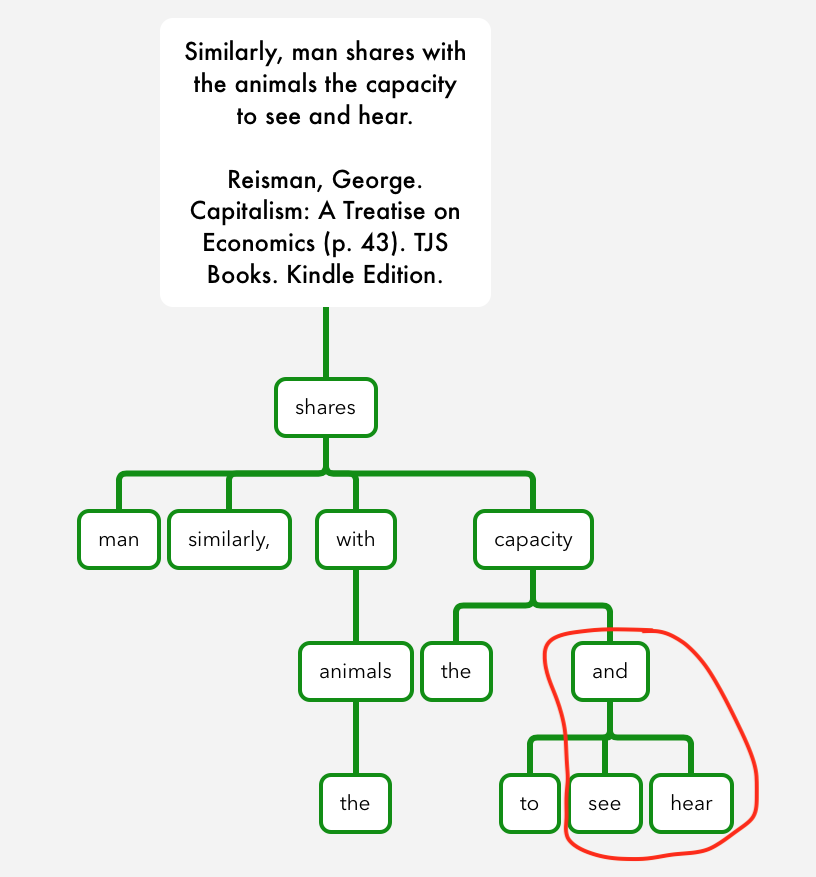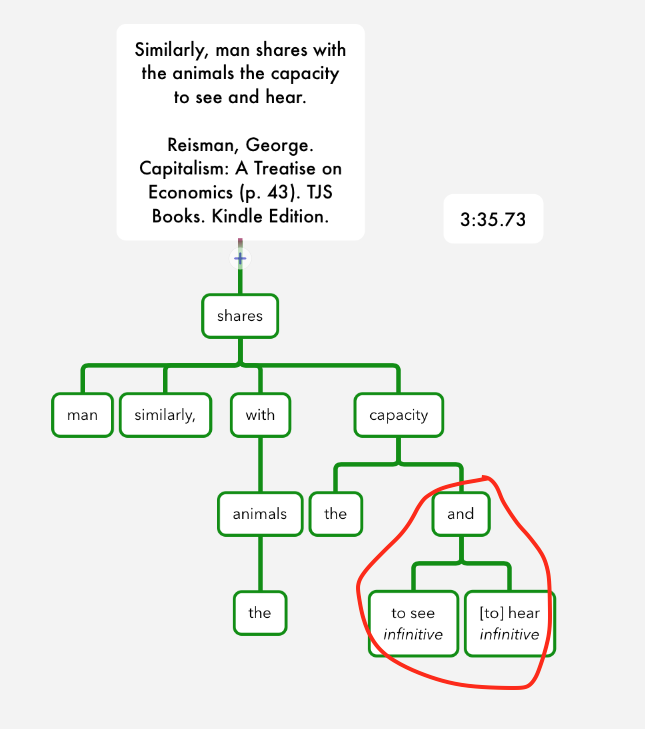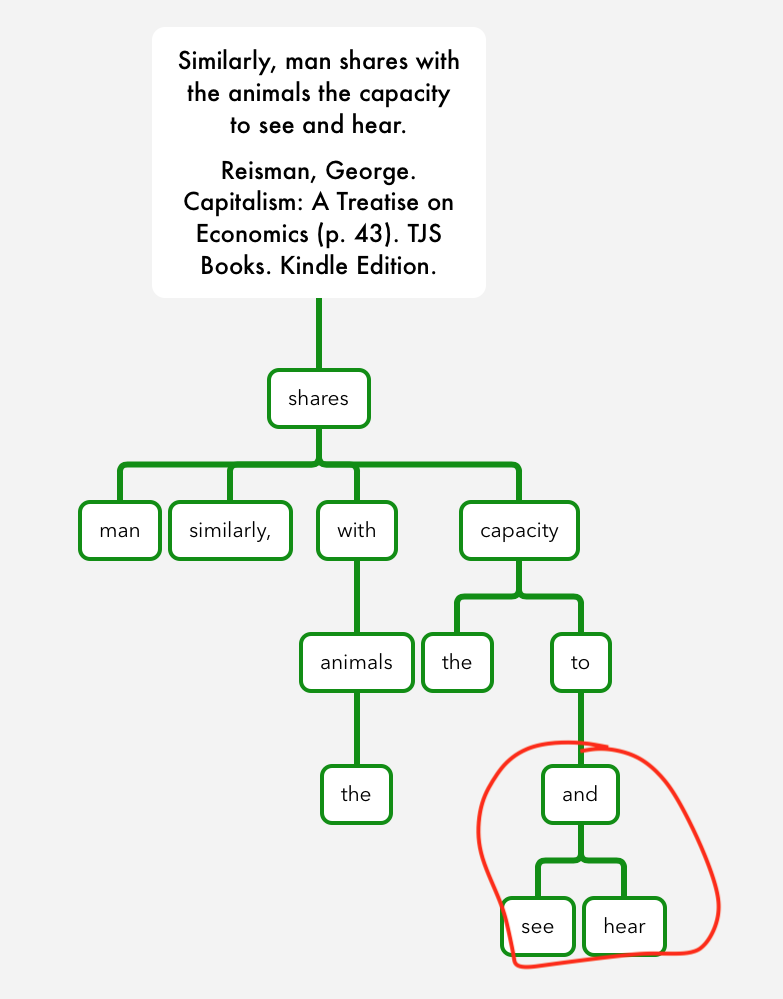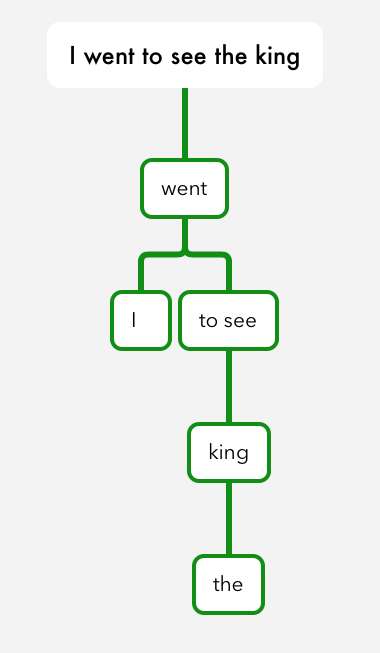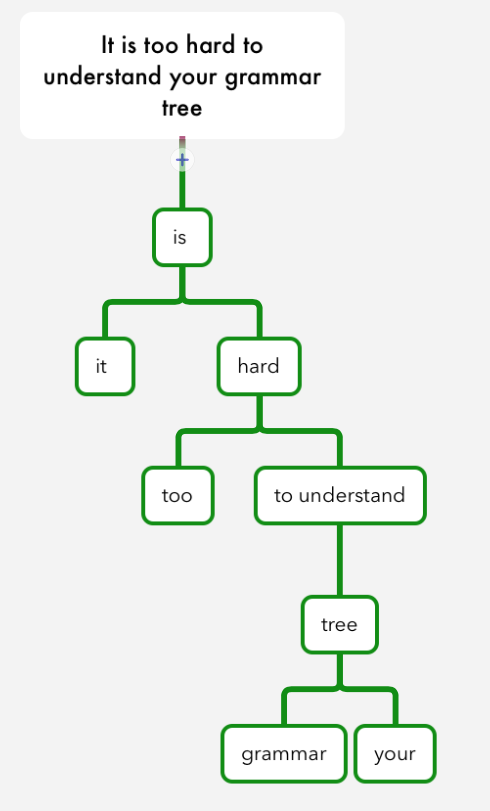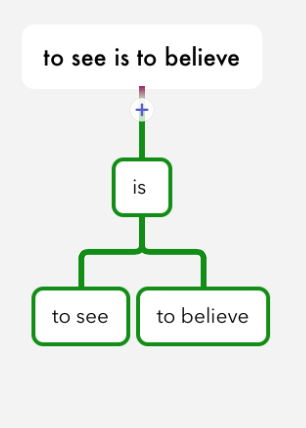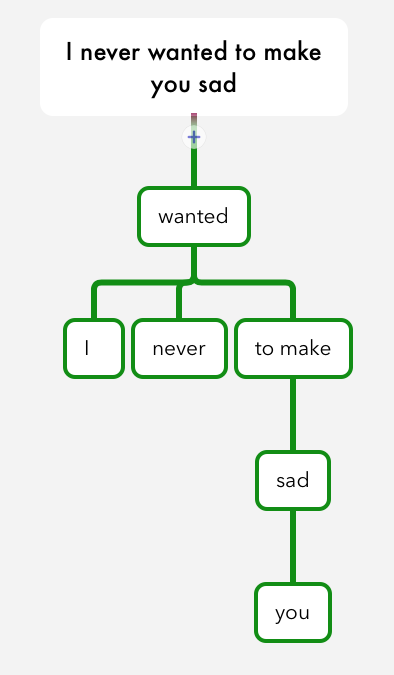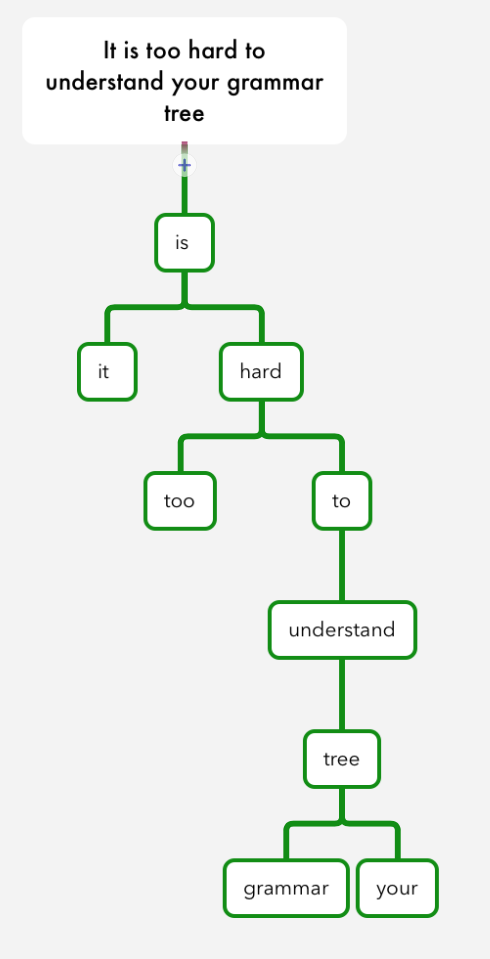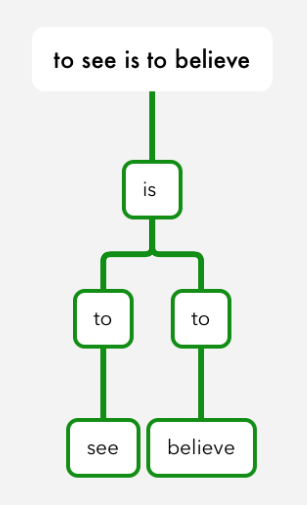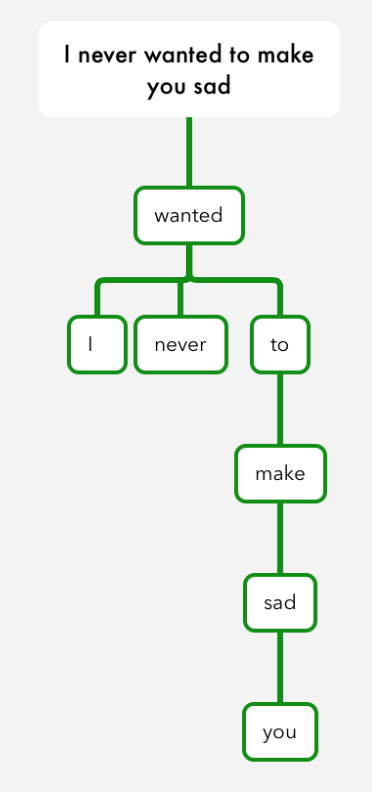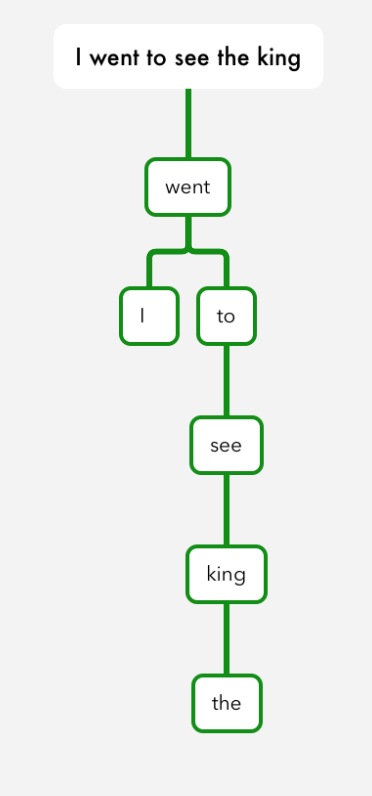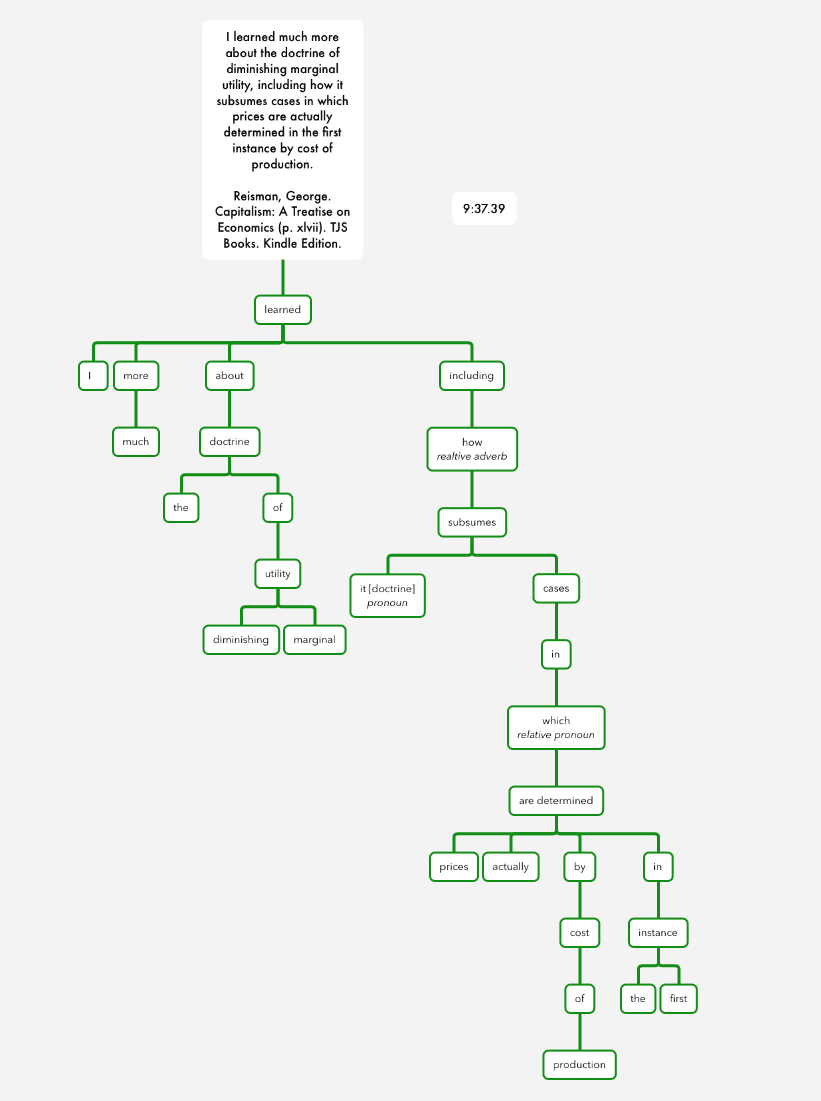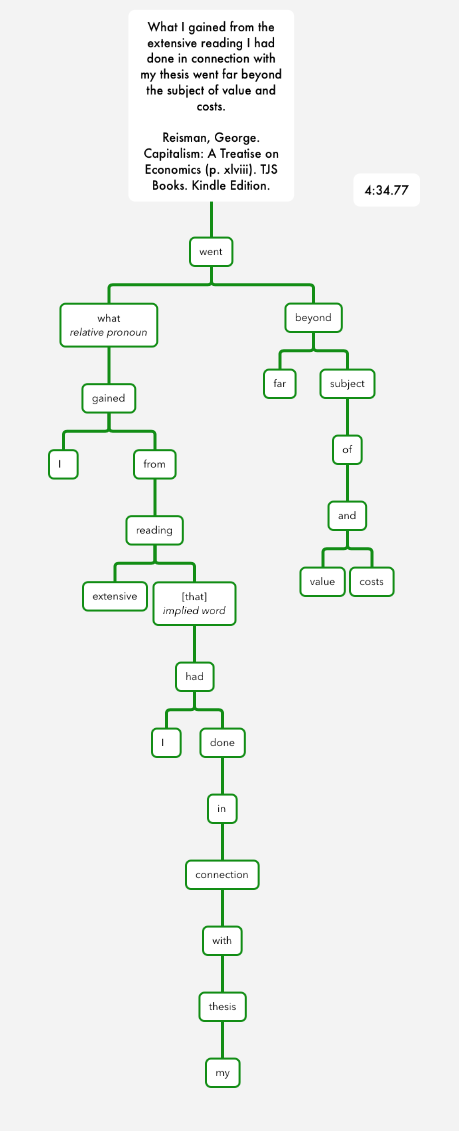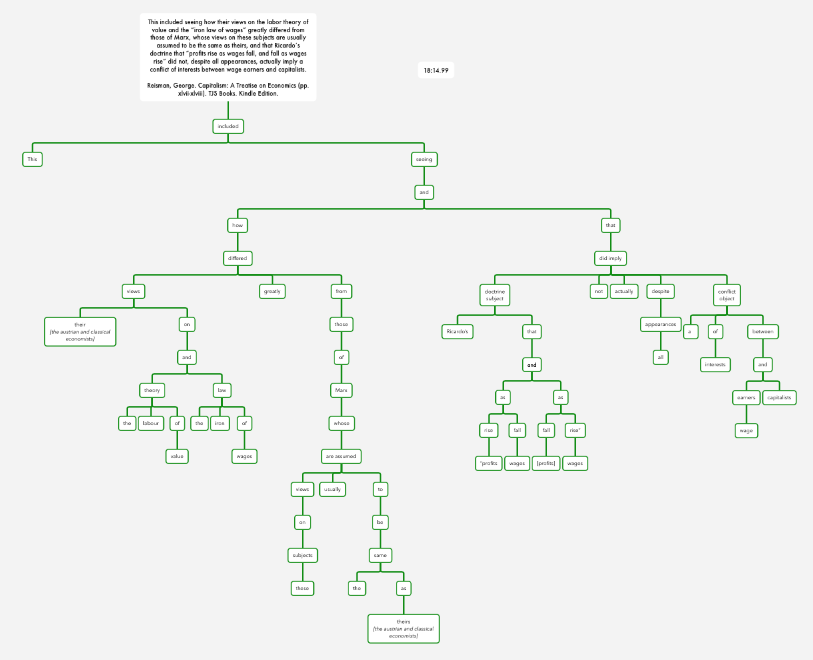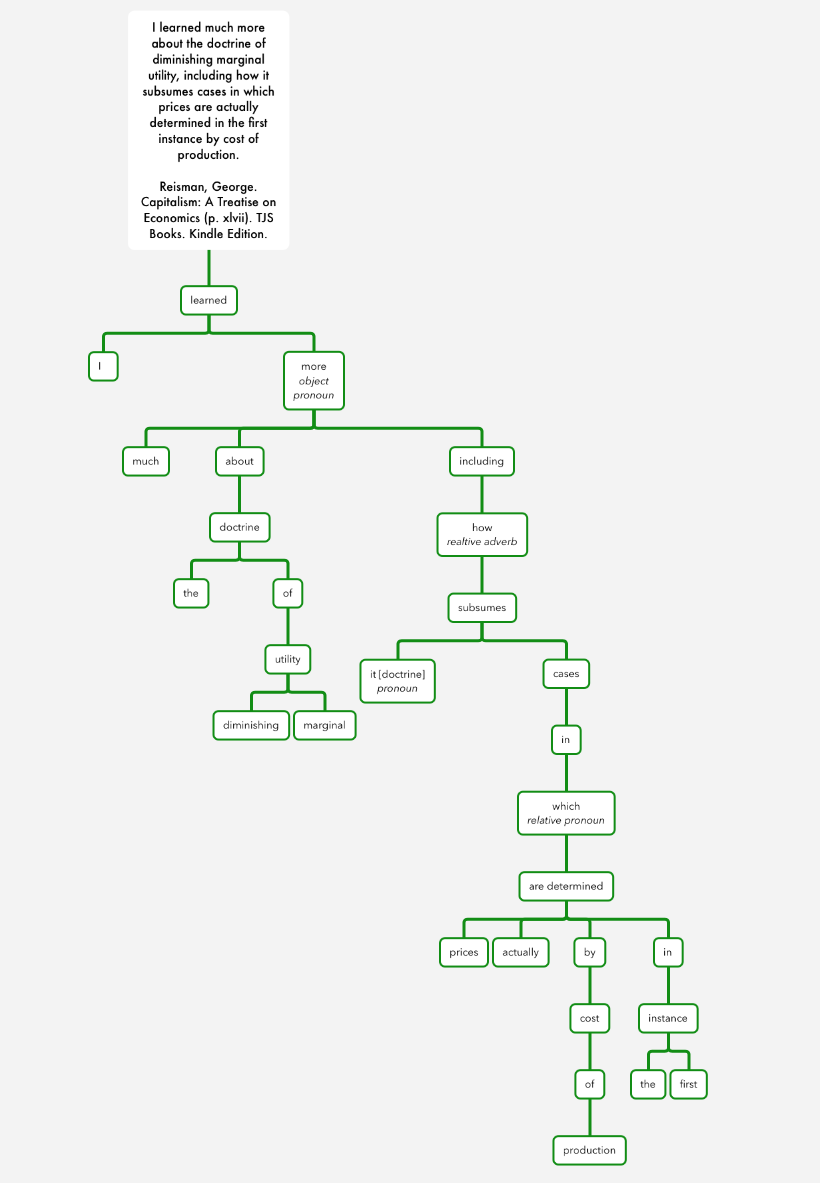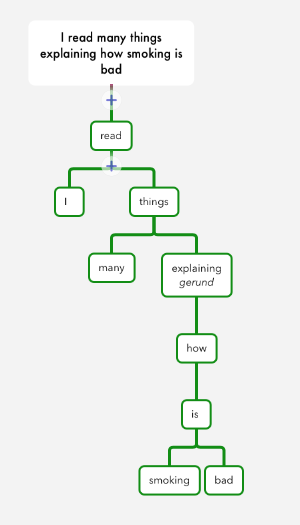Compare the versions.
in the order they appear here
- the ‘to’ modifies the group containing the two infinitives.
- the group includes the ‘to’ marker for ‘see’ and uses an implied ‘to’ marker for ‘hear’
- the ‘to’ is the parent of the infinitive group
criticism?
- I can’t see a problem, the ‘to’ modifies the group. the ‘to’ gives us the info that both verbs ‘see’ and ‘hear’ are in the infinitive.
- using implied words when unnecessary
- I can’t put my finger on why this feels wrong
Tree some simple sentences with infinitives.
Can you do those with “to” in its own node
Ah okay. I think I’ve got it. I’d paired the ‘to’ marker with the infinitive so often, that I forgot how to diagram them separately. Looking at this video of yours on grammar trees I can see that infinitive is a child of the ‘to’ marker.
This makes those above trees look like this:
And means tree 3. of my ‘to see and hear’ variations was correct.
ok i’m glad that’s figured out. next try some more grammar trees, maybe slightly harder
Edited: To include quotes of text and numbered trees.
All sentences from Reisman, George. Capitalism: A Treatise on Economics (p. xlvii). TJS Books. Kindle Edition.
[1]
I learned much more about the doctrine of diminishing marginal utility, including how it subsumes cases in which prices are actually determined in the first instance by cost of production.
9:37.39
[2]
What I gained from the extensive reading I had done in connection with my thesis went far beyond the subject of value and costs.
4:34.77
[3]
This included seeing how their views on the labor theory of value and the “iron law of wages” greatly differed from those of Marx, whose views on these subjects are usually assumed to be the same as theirs, and that Ricardo’s doctrine that “profits rise as wages fall, and fall as wages rise” did not, despite all appearances, actually imply a conflict of interests between wage earners and capitalists.
18:14.99
What part of speech is “including” and how is it interacting with its parent and child?
Going forward, I think you should title trees in the post text so I have something good to quote (I don’t want to quote images in general). It’d also be good to have the sentence text available to quote from, and it could function as the title too.
Okay yes, will do. I’ve edited my previous post to reflect those changes too.
What part of speech is “including” and how is it interacting with its parent and child?
It is a preposition that governs its child, the relative adverb ‘how’, which in turn relates the whole clause under it. It’s parent is ‘learned’ and it provides detail about what was learned about the complement ‘about the doctrine of diminishing marginal utility’.
Prepositional objects are nouns. Do some research on this topic and work on the sentence more.
Prepositional objects are nouns. Do some research on this topic and work on the sentence more.
Okay. So I think ‘including’ can either be a gerund or a preposition. ‘How’ is not a noun, so can’t be the object of a preposition. So I think ‘including’ is a gerund. A gerund can be modified by what are otherwise typically adjective and adverbs e.g ‘quick running’ or ‘running quickly’. So ‘how’ as a relative adverb can modify the gerund.
So am I right that my tree is correct, but I was wrong to think that ‘including’ was a preposition?
Edited: Some wording that was confusing.
If “including” is a gerund, what’s its relationship with “learned”?
I’ve taken notes during thinking about this to outline my thought process.
If “including” is a gerund, what’s its relationship with “learned”?
Hmm, I’m not sure. I think I put it there because it didn’t feel like it made sense elsewhere.
What kind of relationships can a verb have with it’s children?
subject, object, complement, modifier (adverb)
well it’s not the subject (that’s ‘I’)
its not the object (that’s the prepositional phrase ‘about…’)
its not the complement because the verb is an action verb
its not an adverb modifying learned because it’s a gerund
So perhaps it isn’t a child of ‘learned’.
So what could it be a child of?
doctrine?
more?
okay wait, maybe ‘more’ is functioning as a pronoun, not an adverb. Maybe ‘more’ is the object of learned?
This hasn’t really help me find out what ‘including’ is a child of if it’s a gerund. I don’t think ‘including’ could be a child of ‘more’ as in:
I’m finding this a bit hard, and I think I am confused. This has taken me ~35mins so far. Here is the tree adjusted to ‘more’ as the object of ‘learned’.
Here is a simpler and similar tree. Is this correct?
I read many things explaining how smoking is bad
You need to study the rules for parts of speech, including what parts of speech can be parents or children of what other parts of speech.
its not the object (that’s the prepositional phrase ‘about…’)
Objects are always nouns. Prepositional phrases are never nouns. So that can’t be right.
Fallible Ideas – Grammar goes over many of these rules briefly. If that’s not enough, you may need a grammar book.
Also try Grammar as Functions but I don’t know if you have the math/coding knowledge for it to make sense.
You need to study the rules for parts of speech, including what parts of speech can be parents or children of what other parts of speech.
Great, will do.
Also try Grammar as Functions but I don’t know if you have the math/coding knowledge for it to make sense.
I read this and didn’t encounter any math or coding concepts I didn’t understand. I think this way of thinking about grammar will be very helpful.
I practised my understanding of the function approach using some simple sentences from the end of part one of Fallible Ideas - Grammar
[1] John is wise.
[2] John quickly drank milk.
[3] John likes big, fast cars.
[4] John went to the new store.
[5] The ferocious dog chased three cats over the chair.
- is(John, wise)
- is = linking verb taking (subject, complement) and returning finite-clause
- john = subject
- wise = complement
- drank(John, milk, quickly)
- drank = action verb taking (subject, object, modifier) and returning finite-clause
- John = subject
- milk = object
- quickly = modifier
- likes(John, cars(big, fast))
- likes = action verb taking (subject, object) and returning finite-clause
- John = subject
- cars = noun taking (modifiers…) and returning object
- big = modifier
- fast = modifier
- cars = noun taking (modifiers…) and returning object
- John = subject
- went(John, to(store(the, new)))
- went = action verb taking (subject, modifier) and returning finite-clause
- John = subject
- to = preposition taking (noun) returning modifier
- store = noun taking (modifier, modifier) and returning noun
- the = modifier
- new = modifier
- store = noun taking (modifier, modifier) and returning noun
- chased(dog(the, ferocious), cats(three), over(the, chair))
- chased = action verb taking (subject, object, modifier) and returning finite-clause
- dog = noun taking (modifier, modifier) and returning subject
- the = modifier
- ferocious = modifier
- cats = noun taking (modifier) and returning object
- three = modifier
- over = preposition taking (noun) and returning modifier
- chair = noun taking (modifier) and outputting noun
- the = modifier
- chair = noun taking (modifier) and outputting noun
- dog = noun taking (modifier, modifier) and returning subject
Looks good
